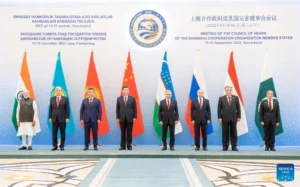
In the rapidly changing geopolitical landscape, the world has witnessed a significant shift in the strategic alliances that shape the balance of power in the Asia-Pacific region. The once-prominent Quad alliance, comprising the United States, India, Australia, and Japan, has found itself at a crossroads, with India’s departure marking a turning point in the region’s power dynamics. In its place, a new coalition has emerged, known as the Squad alliance, which represents a strategic realignment spearheaded by the United States.
The formation of the Squad alliance, which includes Australia, the Philippines, and Japan, underscores America’s commitment to shaping the geopolitical landscape of the 21st century. This move reflects a nuanced geopolitical hedging strategy aimed at countering China’s expanding influence on the international stage. By strategically replacing India with these new allies, the United States has assembled a coalition that is poised to bolster its influence and serve as a counterbalance to China’s assertiveness in the region.
The Quad alliance, which previously focused on issues in the Indian Ocean, has now given way to the Squad’s broader scope. The Squad’s primary focus is on managing tensions in areas such as the Taiwan Strait and the South China Sea, where the risk of conflict with China is perceived to be higher. This shift in emphasis demonstrates a recalibration of priorities and alliances in response to the evolving global dynamics, as the United States seeks to address the growing challenges posed by China’s military and economic rise.
China, on the other hand, views the U.S.-led multilateral groupings as part of Washington’s attempts to contain its rise. Recent incidents, such as the damaging of Filipino vessels and the subsequent U.S. warnings to China, have further heightened the regional tensions. The Mutual Defense Treaty (MDT) between the Philippines and the United States, which binds the two countries to defend each other in the event of an attack, highlights the strategic depth of these alliances and their potential to escalate the ongoing regional rivalries.
The strategic importance of the Squad alliance is further underscored by the advancements in China’s naval capabilities. In 2022, China launched its aircraft carrier Fujian, marking a significant milestone in its military modernization efforts. With a full load displacement of 80,000 tonnes and advanced electromagnetic catapults, the Fujian represents a formidable challenge to U.S. intervention in the region. The emergence of this carrier, along with China’s continued investments in its naval power, emphasizes the need for the Squad alliance to maintain regional stability and counterbalance China’s growing military might.
While the Quad and the Squad share a commitment to democratic values and security cooperation, their scope and membership differ significantly. The Quad remained a regional coalition focused on the Indo-Pacific, whereas the Squad encompasses a more diverse group of nations with a global agenda. This strategic shift reflects the recognition that addressing the complex challenges of the modern world requires a more dynamic and inclusive approach to international cooperation.
Henry Kissinger’s observation that “The balance of power is the scale of peace” underscores the enduring importance of strategic alliances in maintaining global stability. The evolving nature of global threats, such as climate change, cyber warfare, and pandemics, necessitates a departure from traditional regional alliances towards more adaptable partnerships that can address these multifaceted challenges. The Squad alliance’s proactive approach demonstrates the crucial role that collective strength and adaptability play in navigating the complexities of the contemporary geopolitical landscape.
As George Kennan aptly noted, “The greatest danger we face is not the competition of great powers but the erosion of our alliances.” The formation of the Squad alliance is a testament to the enduring importance of these partnerships in shaping the global power dynamics. The transition from the Quad to the Squad represents a strategic and necessary evolution in U.S. foreign policy, as the United States seeks to bolster its influence and counter China’s growing assertiveness in the Asia-Pacific region.
The Squad alliance’s broader membership and multifaceted agenda reflect a recognition that addressing the contemporary global challenges requires a united front and adaptable strategies. The inclusion of Australia, the Philippines, and Japan in this coalition underscores the importance of diversifying partnerships and building coalitions that can address the complex issues that transcend traditional regional boundaries.
In conclusion, the evolving dynamics of global power, driven by the rise of China, the resurgence of Russia, and persistent threats like climate change, cyber warfare, and pandemics, have necessitated a shift in the strategic alliances that shape the geopolitical landscape. The transition from the Quad to the Squad alliance represents a significant milestone in this ongoing transformation, as the United States seeks to strengthen its influence and counter China’s assertiveness in the Asia-Pacific region. This strategic shift, underpinned by the enduring importance of alliances in maintaining global stability, underscores the need for adaptable and inclusive approaches to international cooperation in the 21st century.


















Leave a Reply